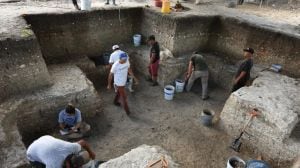Hare Krishna community caught in property tangle
The house where Maya Salakhutdinova lived is now a shell of ruined walls with broken cinder blocks and splintered wood spilling in a heap onto a narrow lane.

The house where Maya Salakhutdinova lived is now a shell of ruined walls with broken cinder blocks and splintered wood spilling in a heap onto a narrow lane. Last month, her house and 11 others in this village, a secluded enclave about an hour from Almaty, Kazakhstan’s commercial capital, were bulldozed by court order.
All the destroyed homes belonged to members of a Hare Krishna community, which has a temple in a converted farmhouse here, as well as 116 acres of farmland. A bulldozing in November levelled 14 Hare Krishna homes.
“I was shocked,” said Salakhutdinova, 43, a Kazakh who joined the Hare Krishna movement 12 years ago. “The day before, I got a notice that I had to leave, but with no date or time. I wasn’t prepared.”
What began as a property dispute between the Hare Krishna community and the local authorities has ballooned into an international controversy that threatens Kazakhstan’s ambition to chair the 56-country Organisation for Security and Cooperation in Europe in 2009.
One of the fundamental principles of the organisation, founded during the Cold War to foster East-West dialogue, is religious freedom. The standoff with the Hare Krishna movement threatens the image of a harmonious, multidenominational country that this Central Asian nation has been cultivating to press its goal in Vienna.
A week before last month’s action, the head of the Religious Affairs Committee at the Kazakh Justice Ministry told an OSCE gathering in Romania that his country had the “most liberal” religious laws in the “entire post-Soviet area.”
But a statement by the OSCE’s Advisory Council on Freedom of Religion or Belief after the first houses were demolished said, “It appears that state-sponsored action has been focused upon members of the Hare Krishna community in a manner that suggests they have been targeted on the basis of their religious affiliation.”
Privately, some Western diplomats say they are mystified why Kazakhstan would tarnish its reputation just as it is seeking support from OSCE member states for the prestige of chairing the organisation. The country was already having difficulty convincing some members of its democratic credentials.






- 01
- 02
- 03
- 04
- 05

























